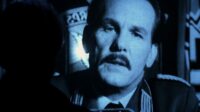Stop Naming Nuts!
That’s what Harlan Pepper’s mother used to shout at him. He’s so credulous, his rather hangdog features mimic his bloodhound Hubert’s face rather well. Harlan is a simple soul, but that isn’t to pass judgement on him. He has an interest, which is right at the centre of Best In Show. Harlan is a gentle, happy, wonderful soul. And there’s a cast full of them in Christopher Guest’s Best In Show.
Lord Haden-Guest, the husband of Jamie Lee Curtis, has an acting and directing career to be extremely proud of, but we’re dealing in this series with his doc/mockumentary films which include This Is Spinal Tap, Best In Show Waiting For Guffman, A Mighty Wind, For Your Consideration and Mascots. Best In Show is right in the middle of that series and might have the most obvious documentary feel of the lot.
Best In Show takes place in the parody-ready world of dog breeding and showing. So whilst we do see those who help those with the dogs, Ed Begley Jr as a particularly sweet natured hotel manager for instance, this is mostly about the owners. Not their dogs.
MacGuffins are plot devices essential for the plot but not important for the story in itself. Here it’s dogs. Essential to a plot about a dog show, but not a big deal in itself.
Yes, there can be some discussion about which dogs reflect their owners. Harlan looks like his rather likable but slobbery old pooch. The Swans have a Weimaraner which is as highly strung as they are. But in this movie, the dogs coming together Mayflower Kennel Club Dog Show are there to introduce us to their owners, and they break into 2 distinct types…
Those Who Need To Win
Gerry and Cookie Fleck, with their Norwich terrier Winky seem made for each other and deferential to so many others. They seem slightly embarrassed to be there, out of their comfort zones, which is an attractive quality in this movie. But as Roger Ebert says; ‘Consider Gerry and Cookie Fleck from Florida and their Norwich terrier Winky…obviously have need of a dog to deflect their attentions from one another.’

But that isn’t all. It never is in Christopher Guest films. Here, Gerry and Cookie have so much below the surface, from trying all the credit cards they can at the hotel – ‘that’s the good one’ – to the visit to Cookie’s friend Max Berman, played with barely concealed anger and pain by Larry Miller. That’s an embarrassment, he’s a suicide negotiator with a bullish approach who tells us ‘they always jump’ – sure they do – and leers at his ex-girlfriend Cookie with ill disguised lust in the presence of her husband, his wife and their child. In fact Cookie’s previous sexual activities are a specific interest to many men who recognise her throughout the movie.
Catherine O’Hara, playing Cookie, doesn’t really fend this attention off, she has a rather coquettish response and in front of her husband, played by Eugene Levy, who plays pain and discomfort so well. Cookie may constantly tell him ‘Who’s my future?’ but there’s a feel that she has settled for something which isn’t fulfilling her. Hence the dog shows. Hence the spending. This couple are funny alright, O’Hara’s wobbly leg when she injures her knee just prior to the final canine walkaround is extraordinary to see.Her husband takes over, but as he says, he has two left feet; literally.
This couple need to win the competition. And after they’ve won? They don’t really capitalise on their success very well, we see them recording a novelty album about Winky, their waggy winner. You can’t come out of your class. And where’s Winky? Nowhere to be seen.
A more obvious choice? Meg and Hamilton Swan. Preppy, tightly wound, pouring all their lives into their dog Beatrice, a lean, taut Weimaraner. But that means they also give their dog all their anger, passive aggression and induct it into their dysfunctional marriage too.
Avoidance is big with Meg and Hamilton. Played by Parker Posey and Michael Hitchcock, they are beautifully regulated, silence, words not spoken which mean so much. They just don’t want to talk, not to each other, not about things that matter, it’s easier and far less painful to put all their time into something else and that’s the competition.

They need to win, to see this through, and they’re willing to throw money around to help that happen, another avoidance tactic. They even give Beatrice counselling. And the scene when they search for a replacement for her ‘busy bee’ toy is hard to watch and hilarious in equal measure. There’s a feeling that Winky and Beatrice are being used to add to their owner’s lives or to distract from those lives. The MacGuffin. To motivate these characters not to look at their own relationships.
…And Those Who Want To Win
Harlan Pepper is full of interests. His business and his family, his staff. The ventriloquism he tries, the nuts he names, the dog show he attends. He hopes he does well, but he doesn’t need to win, he has too much going on. He’s loquacious, he’s a man of simple pleasures, he’s a man who knows himself. The competition isn’t the important thing, he and his dog Hubert at the competition are the main things, for them to have the experience together. He has no thoughts about winning. He has no thoughts about what he’s going to do afterwards except continuing his business. And that’s why he doesn’t need the competition. He’s happy in his own company and he knows who he is; he likes himself too.
Miss Agnes is the shi tzu owned by Scott Donlan and Stefan Vanderhoof. They are business and life partners, in a stable relationship, with a successful celebrity hairdressing business and not at all in need to win this competition. Scott shows Miss Agnes in the competition which is important to him and he’s played with a waspish, gossipy but warm feeling by John Michael Higgins; to make him likable is a significant feat. His partner Stefan, played by Micheal McKean, has such a warm, open, loving feel that he stabilises their relationship. This is perhaps even harder to play, he loves his high-maintenance partner and every one of his foibles, he’s older so there is a little bit of paternalism but not too much to overbalance the relationship and he sees the good in everyone – when Scott complains about someone having money, Stefan says happily and calmly ‘well, so do we’. Played masterfully by McKean, Stefan has comfort, enough money, a good business, a partner he loves; he is settled.

And that’s why this couple are a little bit of a tweener, Scott wants to win and to be seen winning, Stefan supports him but softens that drive, does he really need to win? Can’t someone who really need it take the prize? They want, they don’t need it.
There’s also the chorus, provided by Jim Piddock and Fred Willard, the voices of the commentary team for the Mayflower show. Jim Is Trevor Beckwith, the expert and keen to uphold the traditions of the competition, Fred is Buck Laughlin, the boorish colour commentator.
It wouldn’t be a huge stretch – considering the comments Buck makes about dressing dogs up in Sherlock Holmes hats with a pipe and asking, out of the blue, ‘How much do you think I can bench press?’ – to think that Willard’s sole direction was to try and make Jim crack up. That Piddock keeps himself together is testament to his composure. But this is an example of the push and pull of the characters; Trevor has a need to see this competition go well, Buck is getting paid, but his affable nature suggests he’s just happy to be there, shooting the breeze.
This follows on with the split in the competitors and the way the dog show affects their lives.
Some people know very much about dog shows and for them they’ll be able to spot issues and remembrances in the telling of it. For those of us who don’t show, it’s an exotic and fascinating world. As the NY Times had it; ‘Although the movie pretends to have narrative structure, it doesn’t really go much of anywhere. It is futile to look for deeper patterns in this kind of storytelling.’ And on that level, this funny, funny movie works extremely well. But I’d dispute that that’s the only place it works. This shows us the wants and needs of people living their lives and trying to fulfill themselves. Of all of the Christopher Guest series of mock/documentary films, Best In Show may present those wants and needs in the most fully formed way and for that alone this is a very special movie.



